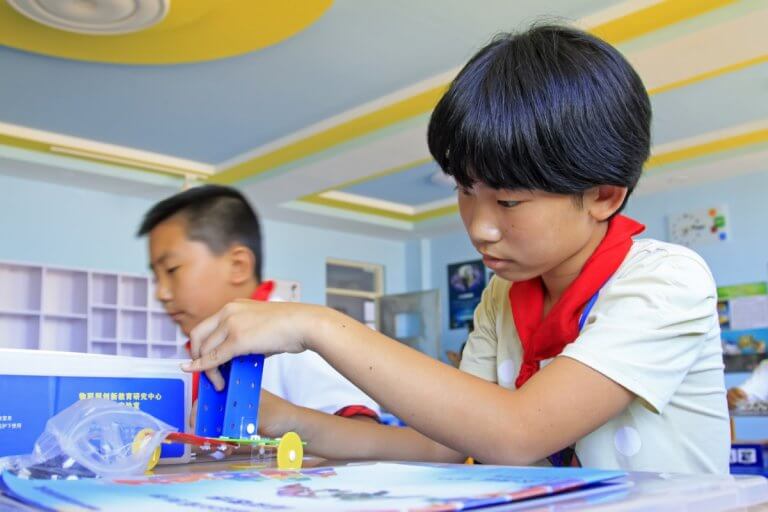
Among the many issues schools must face is the concept of innovation in education. How can educators find ways to make innovation part of the school’s DNA for both staff and students, improving learning outcomes for all?
One promising method for Dulwich College International (DCI) includes listening to teachers’ ideas and giving them the resources they need to transform ideas into realities.
Speaking during the recent fifth annual Bett Asia Leadership Summit 2019 in Kuala Lumpur, DCI Group Head of Educational Technology, Staci Kalmbacher, shared that DCI launched the Pioneering Spirit Grant for teachers across their school network last year, promoting and recognising innovative approaches to learning through technology.
Speaking on the second day of the event during the Creating a culture of innovation session, Kalmbacher explained that the grant award funds action research projects which develop pedagogy, curriculum and/or learning environments that use new technologies, delivery methods or tools that reimagine learning.
In a nutshell, how does it work?

Some of their grants funded small-scale projects, with others involved the whole school, such as their hydroponics project in Myanmar. Source: Shutterstock
A total of RMB 1.5 million (over US$200,000) was awarded to support 12 projects across DCI’s schools, with individual teachers or collaborative groups funding their innovative ideas to improve students’ learning experiences. The programme is applicable across diverse campuses – spread across seven cities in different countries, each with their unique set of challenges – while still “honouring the unique context” of each school they have across the group.
The grant could be used across a wide range of subjects, be it the performing arts, physical education (PE), math, science or the humanities.
Under the programme, teachers are given the freedom to reimagine their classroom. The grant application process means teachers have to think thoroughly about what they want to do and achieve, how it will change their students’ experience, as well as coming up with timelines and milestones and thinking about sustainability.
“We are looking for things that push innovation. By following the actual research process, we ask them to provide their guiding theories and look at research that already supports this type of project,” she explained, adding that teachers needed to think about ideas that are applicable for their unique context and students.

If a grant applicant wanted to improve students’ classroom engagement with their award, they had to be specific and explain how they would monitor and measure this. Source: Shutterstock
The school’s grant was applicable for both small and large projects; Kalmbacher shared how one teacher’s goal was to change the creative writing experience for eight students who were taking poetry classes with her. Each student was assigned a mentor poet – experienced individuals who teach at universities and who are published poets in the UK and US – who worked with students virtually.
With mentors’ co-teaching with the in-class teacher, they worked on each students’ poetry project, which would be published by the end of the year.
On a larger scale, one project in their Yangon campus in Myanmar involved developing a hydroponics system where students, teachers and parents worked together with a local NGO and a village school in the Dala township. Each classroom has a small hydroponics fish tank where students are taught how to seed and plant, as well as what needs to be monitored and controlled for the plants to grow well.
Kalmbacher explained that under the project, the school conducts community classes and lessons to teach residents how to use hydroponics in their private gardens, among other activities.
A programme for other schools to emulate?
Congratulations to our students who received funding for the Pioneering Spirit Grant. https://t.co/8HZMjtVjov
— Dulwich College Int (@in_dulwich) March 8, 2019
A grant system may sound appealing for schools wishing to emulate what DCI has done and achieved thus far, but not all schools have thousands of dollars to throw into such projects.
So while DCI’s budget is exorbitant for most institutions, Kalmbacher notes that this programme is scalable and can be implemented in other schools using allocated funds, adding that schools can also find companies willing to support their initiative.
Following the success of the Pioneering Spirit Grant for teachers, the school launched the Pioneering Spirit Grant for students to recognise and encourage student-led innovation projects and entrepreneurship.
“The first feedback that we received on it (grants for teachers) was [that] we need a similar type of projects available for students,” said Kalmbacher. Following this, RMB 300,000 (US$45,000) was made available for a one-year timeline to fund 10 projects.
“Students had to have a teacher sponsor the project, and we [had] an entrepreneurial focus. However, we wanted it to be wide open, [so] we didn’t steer them towards social entrepreneurship or anything too specific – we want to see what they would bring to the table,” she explained.
“The students [could] choose what they wanted to do, and most of them chose social entrepreneurship,” she said, adding that some students also decided on an “eco friendly-type entrepreneurship” as well as intrapreneurship, where they could give back to Dulwich by creating something that stayed with the school, such as a club.
“So, our goal with this whole programme was to reimagine the way we’re learning in Dulwich, and to reimagine the way students can learn and to remove all the barriers that teachers have in order to think that way.”
Liked this? Then you’ll love…
4 explorative international schools that value student innovation
Balance arts, academics, and athletics for students to reach their full potential







